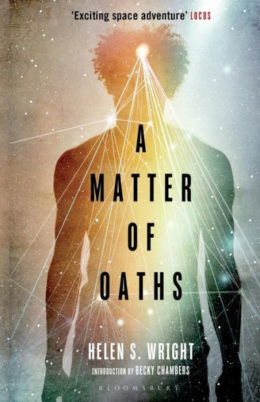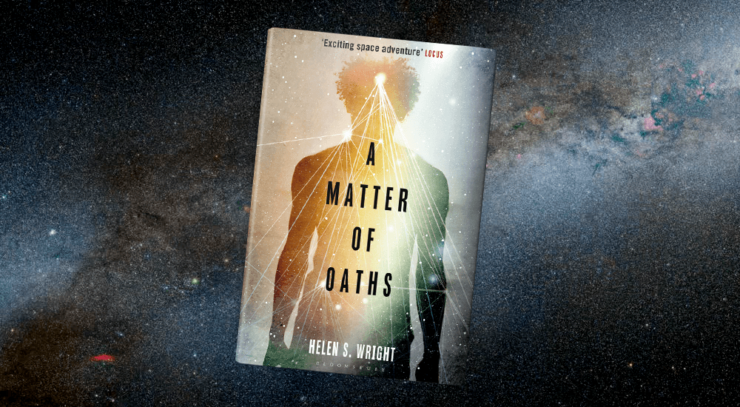A Matter of Oaths is Helen S. Wright’s first and—so far—only novel, originally published in 1988 and re-released in 2017. It is a traditional space opera book with the mindbending, baroque elements characteristic of 1980s SF, but also with very clear queer themes: Two of the male protagonists and point of view characters are in a relationship with each other, and there are other queer characters as well. The gay elements are very matter-of-fact, and both clearly spelled out and treated as completely ordinary in the setting. A Matter of Oaths is not an issue book of any kind, but rather something that’s very much in demand right now: a space adventure with characters who just happen to be queer.
Rafe is a webber: a person who has gone through a set of standard body modifications to be able to connect to the web of a spaceship. Webs are complicated control systems which connect several people together to guide a ship, or perform another task of comparable complexity. Rafe is great at what he does, yet he has difficulty finding a job because of his past as an oath-breaker—he defected from one interstellar empire to another, earning him a mind-wipe and a permanent blemish on his record. Thanks to the memory-wipe, Rafe’s not even sure why he broke his oath. He has spent the decade since then taking jobs far below his expertise.
Rallya is a spaceship commander and an elderly woman, serving well past the time when webbers usually retire, but still going strong. Her ship has an open position, and her Webmaster Joshim is interested in hiring Rafe. Rafe is both talented and charming… but he seems to have enemies in high places. Rafe and Joshim begin a relationship, but troubles start to mount as, after a decade of ignorance, Rafe’s memories of his past slowly resurface. Why does everyone want to kill Rafe, and what can the crew of the spaceship do to prevent it?
A Matter of Oaths is an engaging novel with multiple points of view and a cast that is also diverse along multiple axes. Very few people seem to be white (one of the two rival emperors is a notable exception), queerness is just business as usual, and there’s also some casual disability inclusion. Characters have a fair amount of sex, but it is not shown in detail; I personally did not feel that the narrative was voyeuristic. Sex is an aspect of their lives, but not a particular focus—they are busy enough with staying alive! I was happy to see that the author didn’t fall into the trap of “if the future is more open-minded, then everyone must have a lot of casual sex”—some characters certainly do, while others aren’t interested.
Going in, I thought this would be a novel with space magic, but in my reading, all the magic seems to be very advanced technology. Moreover, this technology has real-world parallels. There were multiple spots in the narrative where I thought the author’s work background showed through; Wright has worked “in a wide variety of Information Technology roles in the electricity generation and supply industry” according to her bio in the book. For example, I felt that one scene where something goes really wrong in the web was especially believable, both in the small details and the larger conceptual aspects of how such a system would work… and how it would malfunction. A Matter of Oaths is quite unlike so much of the early cyberpunk that was devoid of a real understanding of technology, though it shares many of the same core themes.
The only part of the worldbuilding which could perhaps be considered more fantasy than science fiction comes at a point when the characters discuss techniques for remembering one’s past lives, but this happens in the context of religious observance, and at a later point, another character expresses skepticism about reincarnation. The book itself doesn’t seem to take a stance, here: Some people we meet hold these beliefs, while others don’t.
Buy the Book


A Matter of Oaths
Despite the more technological aspects, this is a solidly character-oriented book, and very enjoyable as such: You get to root for the protagonists and become frustrated with the antagonists. I only had one qualm: Rallya has less of a role in the last sections of the book, as she prepares to move into a more political position. I would love to see this followed up in a second book; while the author is now writing again, however, her current project doesn’t sound like a sequel to this novel. I am still holding out hope, because there are many fascinating plot threads that could be addressed. One of the most tantalizing is the plot line where Rafe chances upon a mysterious object whose provenance we never quite find out. Large-scale political changes are also set in motion, affecting the characters’ lives. I feel there is room here for at least a trilogy, if not more… and while there wasn’t as much space for this type of queer storytelling in publishing in the late 1980s, there certainly is now.
Moreover, the book has aged surprisingly well when we consider the broader social context. Minus a little outdated terminology, nothing struck me as particularly hurtful. Sometimes fun queer space adventures adopt science fiction tropes without considering their imperialist and/or colonialist origins, and this can really sour me on entire plots. (“Fight against the evil aliens, whose planet we invaded in the first place” is an example that still keeps reoccurring, even in recent books.) In A Matter of Oaths the author uses empires as a major component of the plot, but they are by and large presented as a problem, not a solution—the characters tilt against the political status quo and are also constrained by it.
The only thing that frustrated me somewhat was the detail about Rafe having some “near-human” ancestry; this aspect of the worldbuilding wasn’t discussed at length. I read it as related to humanoid extraterrestrials, but with Rafe being a person of color, this made me uneasy and brought to my mind books where species is a stand-in for race… though this was mitigated somewhat by almost every other character being a person of color, too.
An endnote for completionists: The text of the re-release seems to be identical to the previous editions, with the exception of the dedication. (Though it should be noted that I do not have a print book of the first edition to compare, only a PDF file that used to be available on the author’s website while the book was out of print.)
Next time, I will be talking about an epic fantasy tome of Tolkienesque proportions and ambitions—one that is almost unknown today!
Book cover: Bloomsbury Caravel; Background image: NASA, ESA, and G. Bacon (STScI).
Bogi Takács is a Hungarian Jewish agender trans person (e/em/eir/emself or singular they pronouns) currently living in the US with eir family and a congregation of books. Bogi writes, reviews and edits speculative fiction, and is a winner of the Lambda Literary Award and a finalist for the Hugo and Locus awards. You can find em at Bogi Reads the World, and on Twitter and Patreon as @bogiperson.










